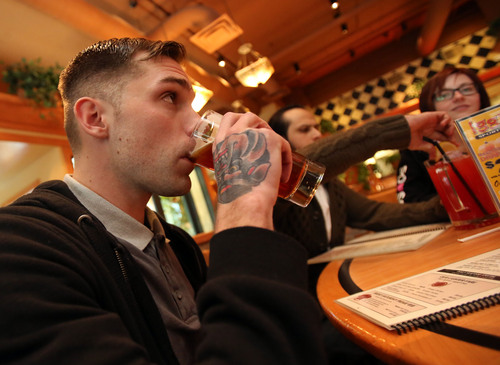This is an archived article that was published on sltrib.com in 2013, and information in the article may be outdated. It is provided only for personal research purposes and may not be reprinted.
We need laws for the times when the needs or wants of one group or individual conflict with those of another. Without a trustworthy legal system hovering overhead, those conflicts can lead to unfairness at best or violence at worst.
So why, exactly, has the Utah Legislature and, more recently, the state's liquor commission, spent so much time an effort worrying about people who want a drink with dinner? The interests involved scarcely conflict at all.
The state, not without reason, wants to have and encourage a class of establishments designed not just to push maximum amounts of alcoholic beverages but to promote the much more civilized habit of a drink or two with dinner.
The restaurants in question want exactly the same thing, or they wouldn't be restaurants. They wouldn't spend all that money on good food, skilled chefs and good china. They'd be bars, saloons or taverns, with cheap napkins, widescreen TVs and bowls of salted peanuts.
And, most important of all for a state supposedly devoted to the supremacy of the free market, it is also what the customers want. Walking into a restaurant, asking for a table, being seated and accepting a menu constitute a set of signals that should be clear to the most casual observer: "I'm here to eat."
The recent decision by the board of the Utah Department of Alcoholic Beverage Control that servers in restaurants can discharge their duty under the law that limits the sale of alcohol in those establishments to those who are also consuming food makes perfect, simple, sense.
All they have to do is ask a simple, if astoundingly obvious, question. Something on the order of: "Will you be dining with us tonight?"
The appreciative diner, one with a little class, will resist the impulse to respond, "Duh!," and play along.
It may take a little explaining to the out-of-towners, those who aren't familiar with Utah's unique culture. But, once the restaurants get their patter down, the habit won't be much more intrusive than the universal practice of asking to see the ID of anyone who appears to be on the cusp of legal age.
The focus should now fall on the only players who might find that their interests have not been accommodated. The DABC, lawmakers, restaurants and their professional association must be on the lookout for any liquor enforcement agents who miss the chance to play gotcha with hard-working restaurateurs and less-than-minimum-wage servers.
Keep the sting operations to a minimum, fellows. People here are trying to eat.



